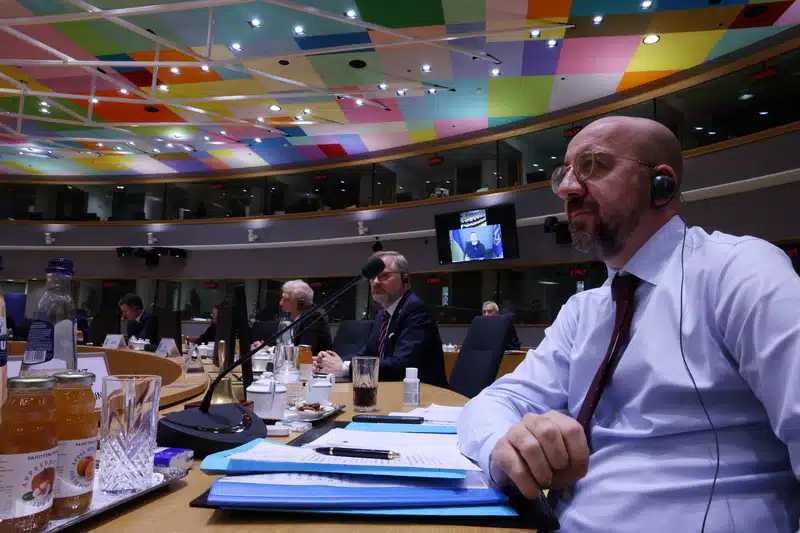Brussels – Community budget review and financing facility for Kyiv: The goal of European leaders meeting on February 1 in Brussels in a Special European Council is still to reach an agreement among the 27 Member States on new EU funding priorities, including the 50 billion euros (33 in loans and 17 in grants) of support for Ukraine until 2027. “There is interest from all sides to find an agreement. It is a collective victory,” a diplomatic source sums up.
Thus, the goal remains the same as the last summit on December 14 and 15, and it is just as hard as it was then to convince Viktor Orbán to approve the whole package. On the eve of the extraordinary summit, more than one source in Brussels admits that they are uncertain about the outcome and there is growing “frustration and irritation” with the Hungarian premier, who says he opposes using the EU budget funds for Ukraine. Against, but up to a point: Orbán has essentially set three conditions for agreeing to include the Kyiv facility in the budget. The first is to discuss and vote unanimously annually on aid to Kyiv, not to pay interest on Recovery funds until Hungary can actually benefit from them, and to postpone the expiration date of their NRRP by two years – from 2026 to 2028 – since Hungary still has not accessed the resources. Sources close to the matter explain that the other 26 leaders are willing to extend a hand to the Magyar premier and grant an annual discussion on funds, but no one is willing to give Orbán new veto power over aid to Kyiv. These official demands, but in the background, there is still the one to unblock 21 billion euros of still-frozen resources.
The idea of granting the Hungarian premier the option of resorting to the so-called emergency brake is also gaining momentum, i.e., a mechanism that is triggered when one or more member countries raise concerns about the implementation of a decision that does not lead to an actual freeze (because it is a decision made by qualified majority and not unanimously) but to a discussion in the European Council and, for example, a temporary suspension of payments.
But that doesn’t seem like a viable route. “Securing a deal is vital to our credibility – and not least to our commitment to provide ongoing support for Ukraine. It is up to us to find a solution and implement it,” European Council President Charles Michel wrote in the traditional letter of invitation sent to the 27 capitals this morning, stressing that the budget compromise proposal presented to leaders allows for a 27-party agreement.
According to Michel’s proposal, the budget increase would come to 64.6 billion euros, including 33 billion euros in loans and 10.6 billion in reallocations from resources in the existing framework. Michel proposes to maintain resources for Ukraine at 50 billion euros (including 17 billion euros in grants and 33 billion euros in loans), 2 billion for migration and border management, 7.6 billion for Neighborhood and Global, 1.5 billion for the European Defense Fund under the new Step instrument (Strategic Technologies Platform for Europe), another 2 billion euros for the flexibility instrument, and finally 1.5 billion for the solidarity and aid reserve.
Michel remains convinced, at least publicly, that a 27-party solution is viable. In the meantime, work is underway for a possible ‘B’ plan to break the impasse, perhaps at 26, while continuing to support Kyiv with macro-financial assistance. One thing is sure: if the leaders leave the Europa Building without a 27-party agreement or without providing resources to Kyiv in an off-budget fund, only one party will celebrate, and it will not be the EU, as they point out in Brussels.
English version by the Translation Service of Withub







